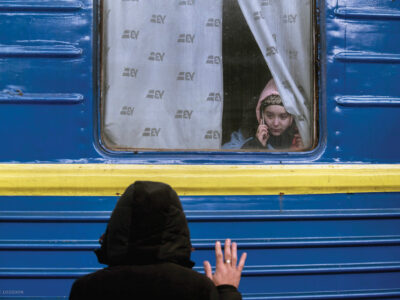
When a delegation from Vladimir, Russia, came to Bloomington-Normal, Illinois, in 1989 to sign a sister-city agreement, Dr. Ronald Pope Gr’75 served as an interpreter for the occasion. “Out of that,” recalls the associate professor of Russian politics at Illinois State University, “I wangled an invitation from the Russians to observe their local elections in March of 1990.”
It
was not his first trip there. The political scientist, who now heads an
organization called Serendipity-Russia, had been studying and visiting
the Soviet Union since 1962—and predicting that the Soviet system was
going to collapse. “I wanted to get directly involved” in reforms, he
says. “I didn’t want to continue just as an academic, observing.”
So
in the early 1990s Pope organized the American Home Project, coordinating
the building of an American-style home in Vladimir to provide a model
for modern construction standards there as well as a base for educational
and cultural exchanges, humanitarian aid and other programs. Like the
new Russia, the project has experienced ups and downs.
Pope
started a successful English language- and culture-instruction program
for Russians, with classes taught by native speakers. “We’ve had medical
doctors who started out class at the beginner level and could not understand
their American colleagues. Now they can go to conferences and they don’t
need interpreters.” More recently, the American Home—known in Vladimir
as Amerikanskii Dom —began hosting an intensive Russian-language
program for English-speaking visitors.
Both
programs are run under the auspices of Serendipity-Russia, which has also
sponsored U.S. exhibits of the work of Vladimir artists and has helped
local artisans, such as the Vladimir Quilting Club, sell their crafts.
“They earn more money from the sale of one quilt than they make in a regular
job in a month,” Pope says.
Serendipity
organizes for-profit tours, scheduling a trip in August for American quilters
who want to meet their Russian counterparts and coordinating another tour
in May for those interested in observing Russia’s criminal-justice system.
It has helped nine Russian law-enforcement officers come to the United
States for special training. It sponsors a local basketball program and
coordinates the donation of medical equipment by American hospitals to
Russian hospitals.
Like
many Russian cities, Vladimir has experienced a bumpy economic transition
during the past decade. Pope points out that many of its traditional industries,
such as electrical-equipment manufacturing and chemical plants, are doing
poorly. But at the same time, Pope observes, “There is a lot more of a
market economy in operation in Russia than critics ever talk about. When
we built the American Home, we could not find any building materials in
Vladimir except for concrete —and that was not good quality. Now we can
buy anything there.”
Pope’s
organization has had its share of setbacks. In 1994 Serendipity started
a remodeling business in Vladimir to help pay its bills. Then Pope found
out that one of his employees was embezzling profits. Because the woman
had connections in high places, he was advised not to pursue a case against
her. In fact, Russian auditors recommended that his firm cover up the
fact that the employee had faked sub-contracts, warning Pope that if she
were not found guilty, his firm would be held accountable under Russian
law for unpaid taxes and fines.
But
Pope wanted to set an example. “My argument was if we’re going to fail,
we’re going to fail honestly—not because we try to cover up some theft
and they catch us later on. It was the right thing and it was the smart
thing.” She was ultimately found guilty and sentenced to five years in
a penal colony. “That was not my idea,” Pope adds. “We would have been
better off if she had continued to work and paid back the money.”
Still,
Pope is looking to the future with optimism. “If we can build our tour
business it’s going to mean a lot more income for quite a few people in
Vladimir. And if the construction [climate] improves, we’ll be able to
hire more people” for the remodeling business. He’d also like to build
a new American Home in another Russian city one day. “Despite 74 years
of communism, and all the damage that did to basic morality, and all of
the tremendous hardships, there are some really good people there working
really hard to try to make things work.”




